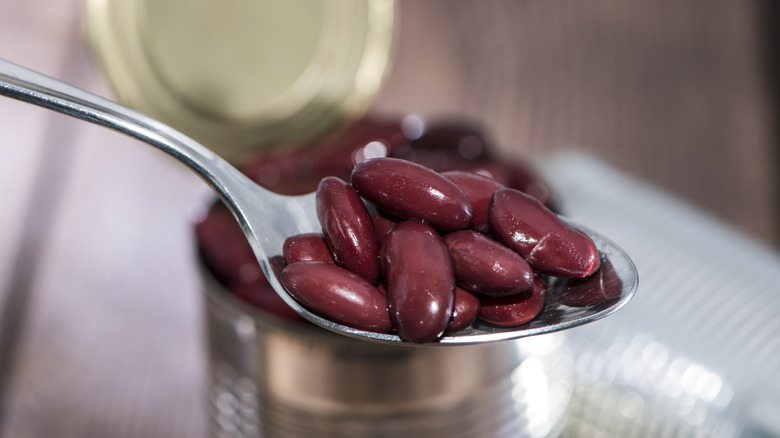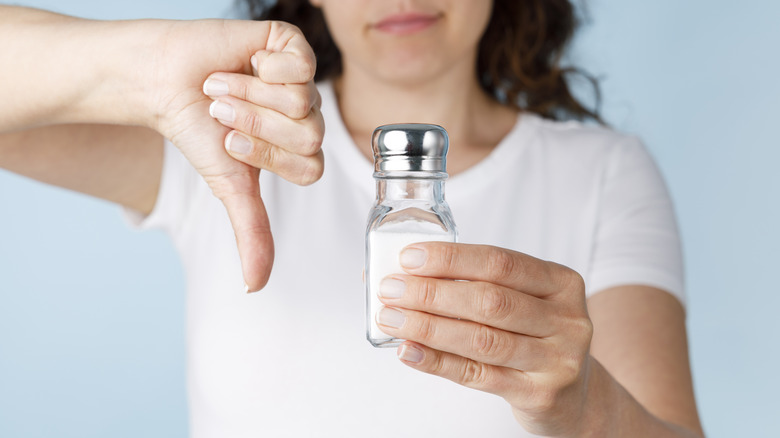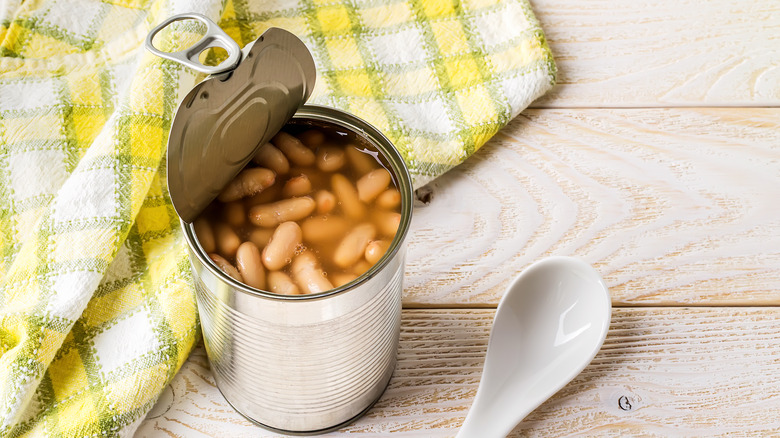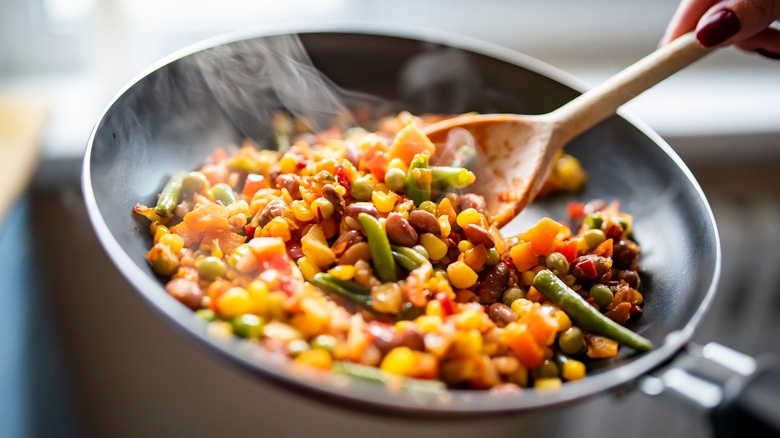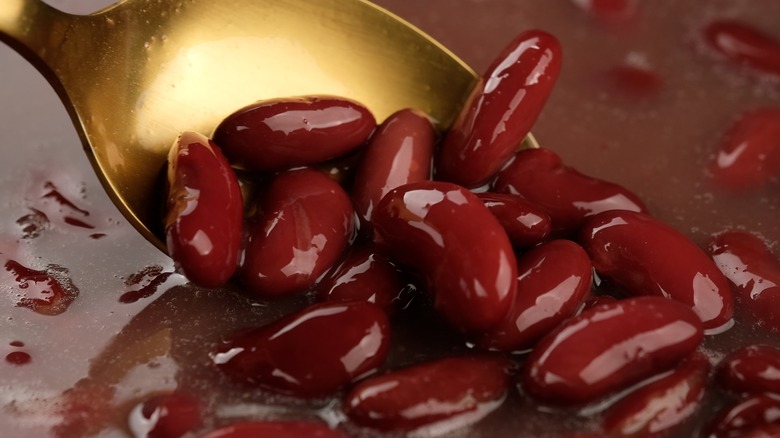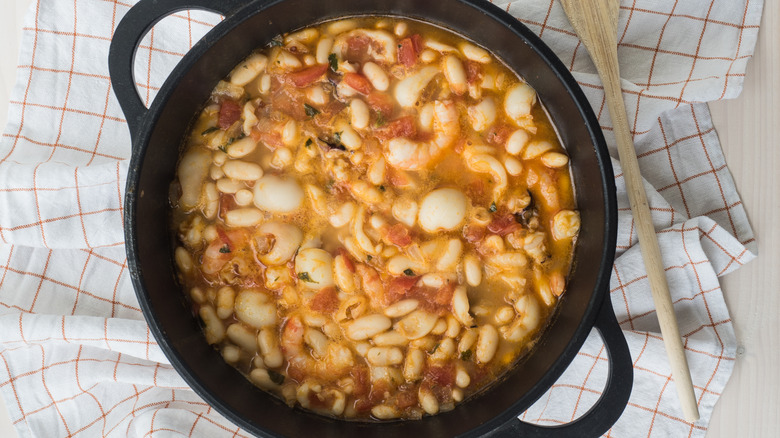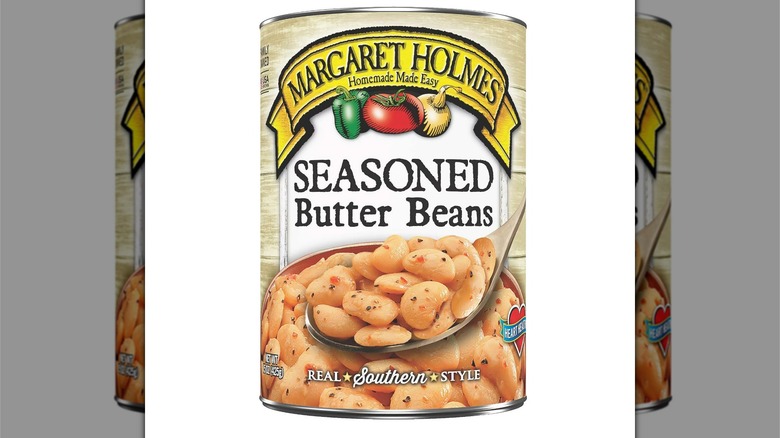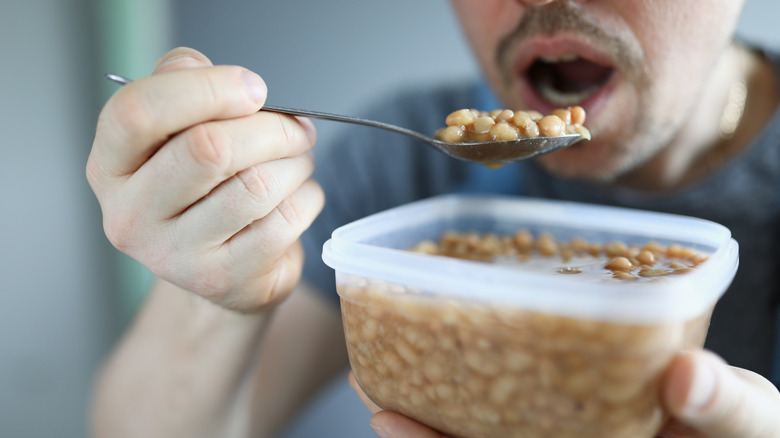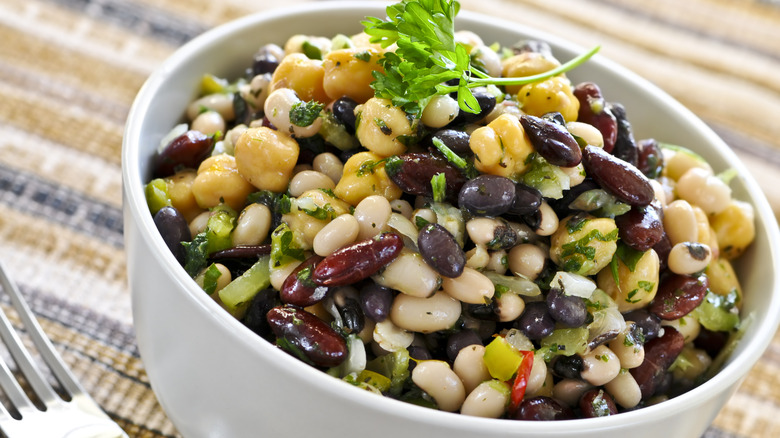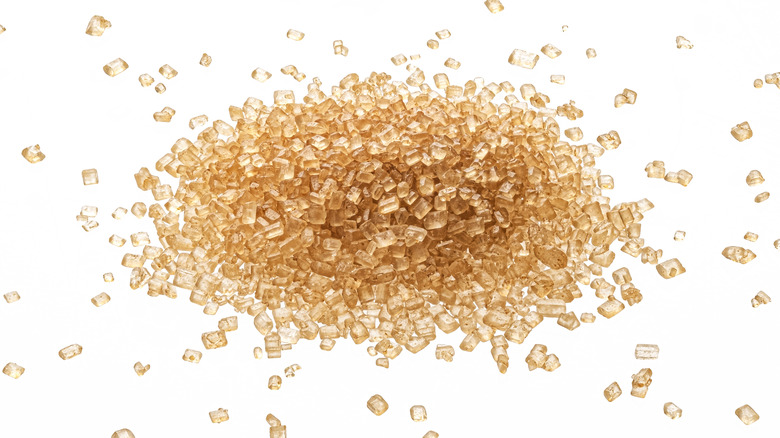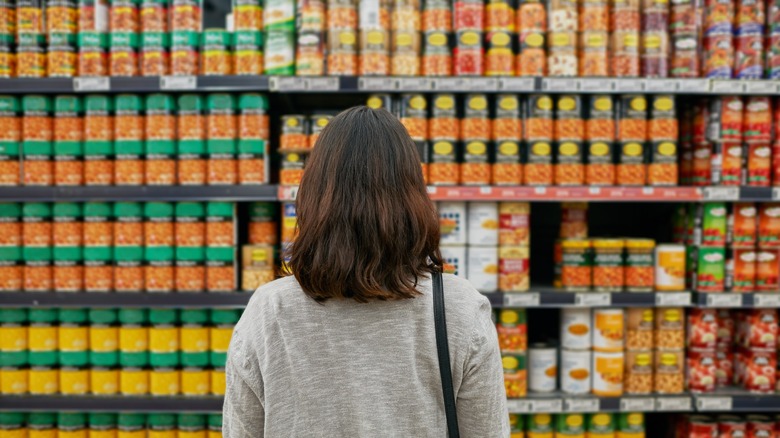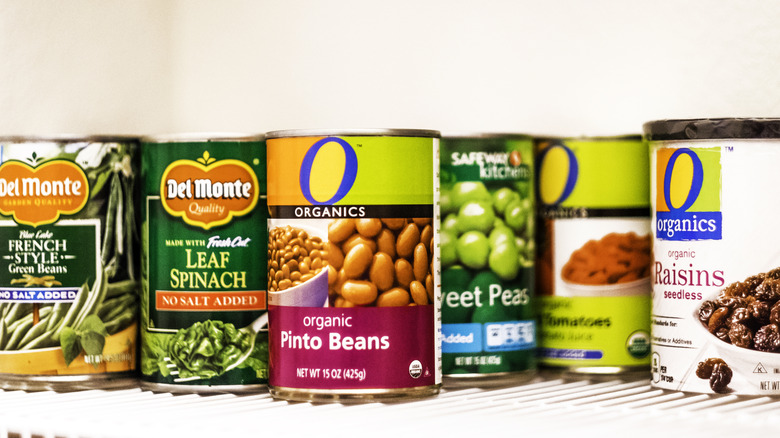The Pros And Cons Of Cooking With Canned Beans
Canned beans have so many unique and convenient uses, it's hard not to love them. Chock full of health benefits, this canned food is often found stashed away in many American pantries. But are there cons to using them?
In this article, we're going to answer just that. Though canned beans prove helpful in terms of health and convenience, there are several ways in which this option falls short when compared against dried bean varieties. Instead of focusing on the disadvantages of canned beans alone, however, we thought it might be helpful to examine the pros and cons of cooking with canned beans side by side.
By examining canned beans in terms of taste, convenience, and their overall value, you'll walk away having the information you need to determine whether or not buying canned beans is indeed right for you. Join us for the scoop on the pros and cons of cooking with canned beans.
Con: Canned beans can be overly salty
We've consulted experts in a previous article regarding common mistakes people make when cooking baked beans, and several of these pros asserted that canned beans often come overly salted. As Sunita Yousuf of The Wannabe Cook tells us, "Canned beans come in a thick, cloudy liquid that contains preservatives and high sodium levels." Because of this, it's often a good idea to rinse the beans before using them in your favorite recipe, especially if that recipe requires additional salt.
Still, even after rinsing them, you may only have removed about 40% of the sodium therein, according to the Bean Institute. Thus, if excess sodium is something you're trying to avoid in your diet, it may be best to use dry beans or, at the very least, seek out lower sodium canned bean varieties to lessen the likelihood of ingesting more salt than you intended.
If you must use regular canned beans, the easiest way to rinse them is to use a large mesh strainer. Simply dump your can of beans into the strainer over a sink and allow the bean juice to run out. Give them a good rinse with water before transferring them to your pot to be used in your favorite recipe.
Pro: Canned beans are easy to use
This one goes without saying, but canned beans are so much easier to use than traditional ones. Dried beans require that you soak them before use, oftentimes overnight, before you then have to boil them for one to two hours, all before you're able to enjoy a meal. Not so with canned beans. Instead of having to cook them, you can instead enjoy them straight out of the can, if desired. If you don't wish to eat them that way, they are easily reheated over the stove or in the microwave.
They can also be added to those insanely popular and oh-so-easy slow cooker dump-and-go recipes that work to make pulling dinner together a cinch. Thus, canned beans are a simple and easy way to reap the nutritious benefits of the coveted "musical fruit" without having to put in too much prep, effort, and cook time beforehand.
Con: There's always the risk of overcooking canned beans
When using canned beans, it's important to remember that they are already cooked, and thus, don't necessarily require more cooking. If you cook canned beans the same way you do dried beans, you'll likely end up with a mushy and unappetizing mess that's sure to ruin your dish.
Not only will you not want to cook these canned beans for as long as you would dried beans (for several hours), you'll also not want to cook them very long in general. While you may sometimes get away with cooking them longer periods of time in a slow cooker, as a rule of thumb, most canned beans should be cooked for no more than 20 to 30 minutes or until heated through for best results.
Make sure that you are cooking the beans over a gentle simmer at medium-low heat so as not to scorch your beans or make them mushy. When simmering, combine these with seasonings if needed along with a bit of broth for flavor and for added liquid. Remember too that these steps are totally optional –- technically, canned beans are perfectly fine eaten straight out of the can if you'd rather not negatively alter their texture.
Pro: Canned beans come in nutrient-dense water
This one might sound a little contradictory, especially because we just told you that it is often best to rinse beans to prevent your dish from tasting overly salty. While the aforementioned point is still very true, it is also the case that canned beans come packed in nutrient-dense water. According to Diane McKay, PhD, an assistant professor at Tufts University's Friedman School of Nutrition Science and Policy, sodium isn't the only thing that lurks in murky canned bean water. Though rinsing the beans will remove approximately 40% of the sodium, it will also remove some of the water-soluble nutrients that have leeched from the beans into the water. Such nutrients include B vitamins and folate, though Dr. McKay advises that there are still plenty of minerals left in the beans after rinsing along with a good amount of digestion-friendly fiber.
So, should you rinse the beans or not? Honestly, that one is up to you. When it comes to getting the full benefit of the vitamins that canned beans can provide, you can absolutely consume the liquid the beans are swimming in to reap the full health effects. Nevertheless, if you choose to rinse the beans, you'll still benefit from a good amount of nutrients and will bypass the extra sodium and preservatives present in some bean varieties. Ultimately, the choice is yours!
Con: Canned bean juice comes with a funny taste
Another reason to rinse your beans is that canned bean juice can taste a little off when eaten plain. Not to say that it's anything you can't overcome –- you definitely can. Still, when compared to dried beans, canned beans just tend to taste, well, kind of like a can.
Thankfully, a quick rinse in the sink can remove this taste, at least for the most part. Like when rinsing the beans to remove excess sodium, you can also use a large fine mesh strainer to rinse off beans to remove the metallic taste. If you still think your beans taste a little strange even after rinsing, take heart; you can still add whatever seasoning you wish to help flavor the beans and get them tasting how you like them. Still, we have to admit that this is a definite con about using canned beans –- especially if you were planning to hang on to that nutrient-dense canned bean juice.
Pro: Canned beans come in plain and seasoned varieties
Canned beans can often sound super mundane, and indeed, some varieties really are. In a few cases, you've got plain beans swimming in salty and metallic-tasting water, and, to be real, it doesn't always sound super appetizing. Despite this fact, there are some cases in which plain beans like these work perfectly, especially in recipes that call for beans with no added seasonings or frills.
On the flip side, there are times when you want a dinner or side dish that's quick, easy, and comes already seasoned. In that case, a can of sweet baked beans, seasoned spicy black beans, or another flavorful rendition of this protein-rich food will more than fit the bill.
All in all, it's safe to say that canned beans provide a lot of versatility when it comes to how to use them. Seasoned varieties are best for when you don't want to experiment with flavors but instead want something quick and tasty. Plain varieties, on the other hand, prove perfect for using as a blank canvas to conjure up your own medley of flavors. Either way, using canned beans in this category proves to be a win-win.
Con: Canned beans may contain additives
This one might sound surprising, but if you've ever sampled canned baked beans or seasoned canned beans of any kind, a quick glance at the ingredient label will prove it true. Indeed, canned beans may contain additives, though we realize that this fact might not bother everyone. From caramel coloring to monosodium glutamate and more, there can be quite a few ingredients in canned beans that you wouldn't necessarily see in a homemade pot of beans made from dried varieties.
So, what's the big deal about additives anyway? That depends on which added ingredients you're talking about. In general, additives are less than ideal because some of them can cause health issues. And while there is no lack of controversy surrounding the use of additives and the research is still ongoing, certain ones, like monosodium glutamate, can trigger symptoms in sensitive individuals. So certain people will want to avoid additives like these in favor of their health. Thus, while this may not be a deal breaker for all, canned beans can often contain more ingredients than you bargained for, especially when compared against beans made from scratch.
Con: Canned beans may not exactly taste homemade
We've aready mentioned that canned beans tend to take on a metallic taste, but in general, canned beans tend to lack flavor in general. Of course, we aren't necessarily talking about flavored varieties here, but even if we were, we gotta be honest and say that it's going to be a rare occasion that anything canned is going to taste like it was made from scratch.
Can you elevate canned beans and make them taste fantastic? Absolutely. In fact, we recommend doing just that. But if you're expecting to open up a can of beans and want them to taste exactly as they would if you had soaked dry beans and cooked them on your own, you're kidding yourself.
But, canned beans can be delicious in their own right. Just know that certain beans, especially those with additives, may taste a bit less spectacular than what you're used to ... and as long as you're okay with that, we are too.
Pro: Canned beans offer more opportunities for variety
When it comes to using canned beans, expect to enjoy more variety, especially when it comes to mixing and matching. According to Healthline, different beans offer distinct benefits to the body, and thus, it really helps when you're able to sample a variety of beans at once without the chore of having to soak and cook each type.
Traditionally, in order to enjoy multiple bean varieties at once, you'd have to soak them all, cook them up, and watch to ensure each type gets cooked properly. This could get tricky, especially since some beans take longer to cook than others. When eating canned beans, however, the benefit is that the beans are already cooked. This makes combining different bean types in a single recipe all too easy and doesn't require multiple pots, pans, and soaking bowls to get the job done.
In need of ideas when it comes to interesting ways to mix up the types of beans you get in your diet? You could try purchasing three bean canned varieties, as these come with different bean types already mixed in the can. If that doesn't suit your fancy, you could simply purchase canned beans separately before mixing and matching them according to your entree. For example, black beans combined with pinto pair well with Mexican or southwestern dishes, while red kidney beans and black beans prove a masterful duo when it comes to complementing chili. Go ahead, get creative!
Con: Canned beans may be excessively high in added sugar
Now, this certainly isn't always the case, and in fact, canned beans are usually relatively low in sugar, if they contain any at all. Typically, canned beans that contain the most sugar are usually types like baked beans or pork and beans, in which ingredients, like added sugar and even high fructose corn syrup, are often used to create that intensely sweet and satisfying taste we all associate with delicious baked beans.
When you do run across canned beans of this variety, you should know that we usually aren't talking about a little sugar added here and there. Instead, you can expect a single serving size to contain an excessively high amount, sometimes even as much as a single Chips Ahoy cookie. As in the case of a can of Bush's Original Baked Beans, you'll find up to 11 grams of added sugar per ½ cup of baked beans. According to the American Heart Association, only 25 to 36 grams of added sugar should be consumed by the average individual — per day.
As much as we love the convenience of canned beans, we'd be remiss if we didn't at least warn you that some brands may contain an exorbitant amount of sugar per serving.
This may be of particular concern if a low-sugar diet is of importance to you.
Con: Canned beans can be more expensive
This one's a bit tricky, but we're going to try to explain it the best way we can. In a nutshell, you can mostly expect dry beans to be cheaper than canned beans. Even so, the price difference isn't always super obvious. For example, when comparing a can of pinto beans at the store with dried pinto beans at seemingly the same volume, you may be tempted to think canned beans are indeed the cheaper option. In reality, however, once the dried beans are cooked, you'll notice that these end up yielding a much greater quantity than the canned beans at the same volume. This means that a pound of dried beans will yield more than a pound of pre-cooked canned beans, thus proving that dried beans are indeed the better value.
Still, if it's only a can or two of beans you need, then by all means, it may just be faster and easier to cook with the canned variety. But if you're needing to make a huge batch of beans, or want to consume them daily, it might be easier on your wallet to simply purchase dried beans; you'll end up with a much greater quantity of them in the end.
Pro: Canned beans are long-lasting and shelf stable
While it's true that dried beans can last quite a while in the pantry, there does come a point when dried beans go bad. And while you may still be able to consume them, they may not have the same qualities about them that they once did, particularly if it is after their expiration date. These beans can then become difficult to rehydrate, and thus, may not be as appetizing to the palate.
When it comes to canned beans, however, they tend to fare a bit differently. According to the USDA, canned food can last for years, especially if the can itself is free from dents and other imperfections and the beans aren't swimming in acidic ingredients. In this way, canned beans, though more expensive, can prove a very convenient and cost-effective way to keep this fiber-rich food at the ready — especially since it may sometimes keep at best quality even longer than its dry bean counterpart.
As always, it's important to keep an eye on the expiration date when it comes to canned beans, despite the fact that they may still prove edible even past the date printed on the can. Use your sense of sight, taste, and smell to help you further determine whether or not the beans are safe for consumption. When in doubt, throw it out. So, in general, canned beans can be a long-lasting and nutritious option to keep stocked on your pantry shelf.
